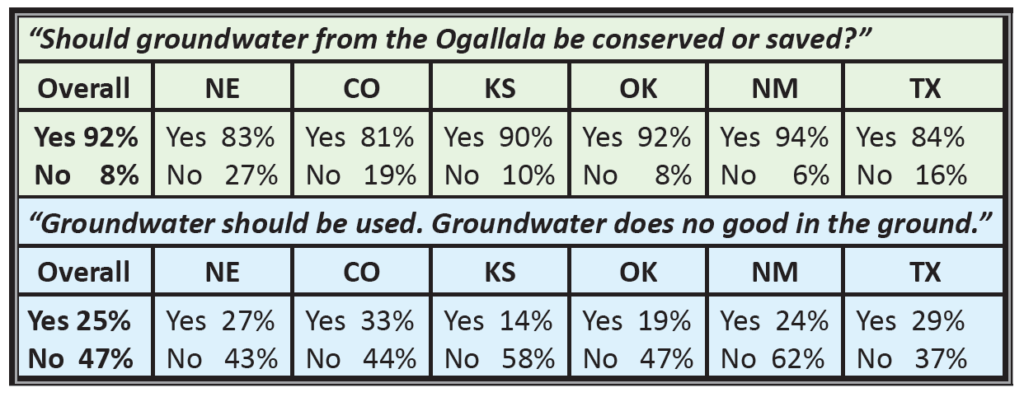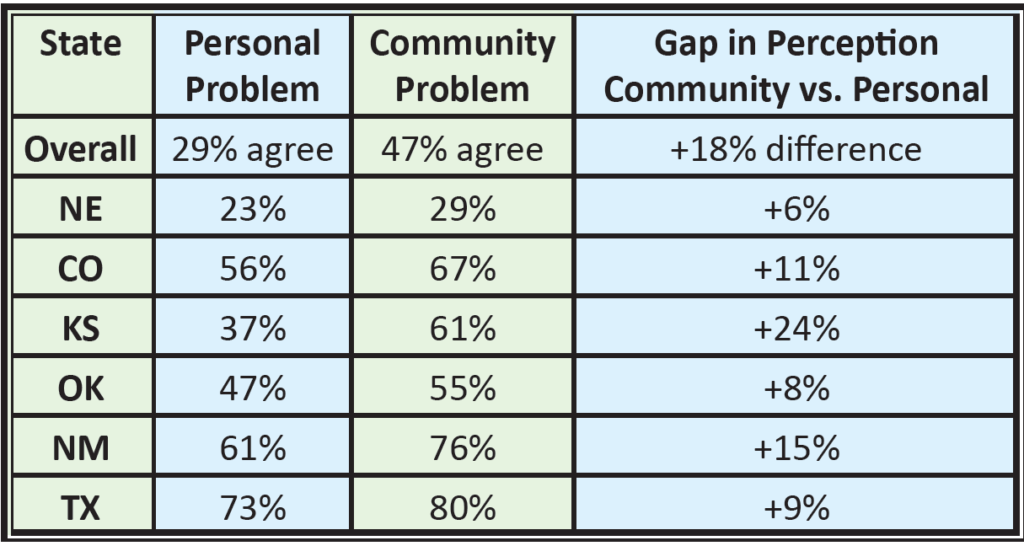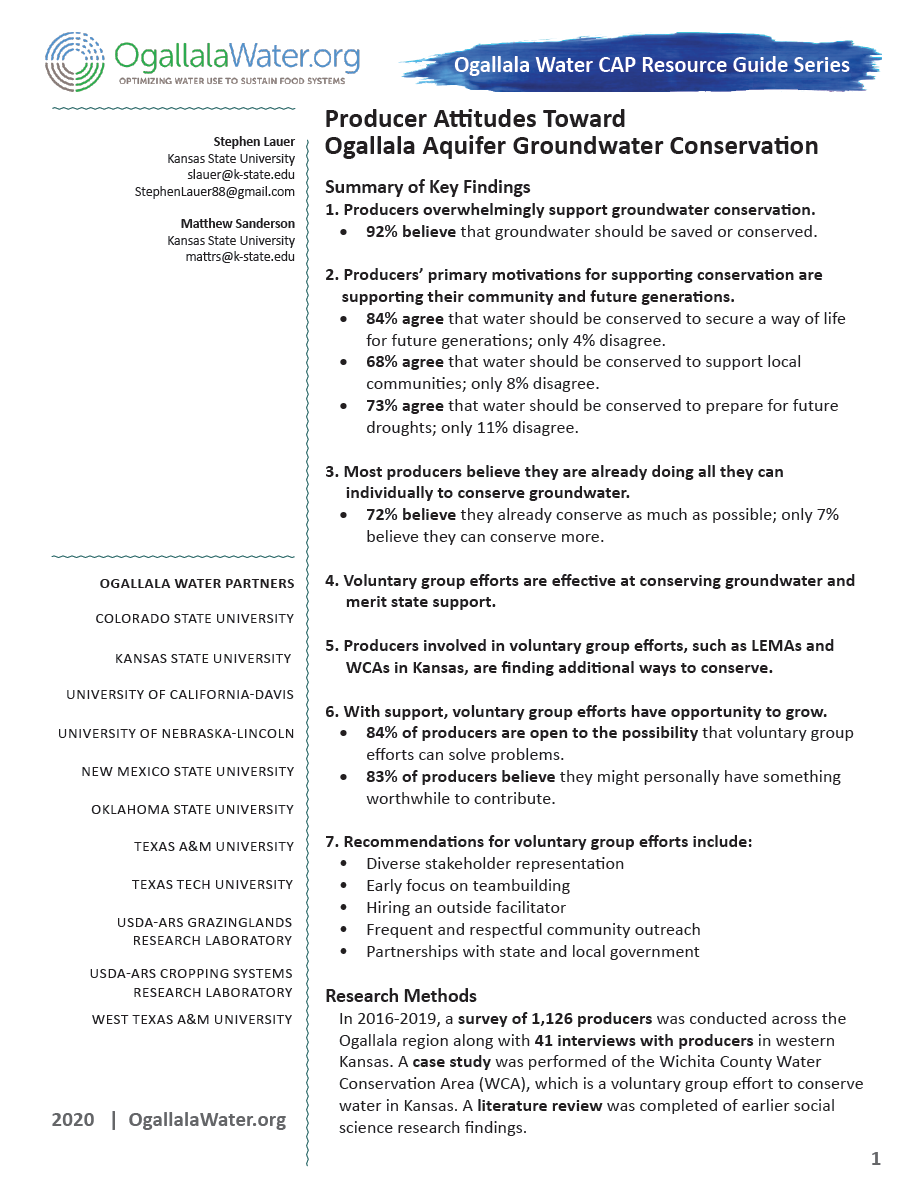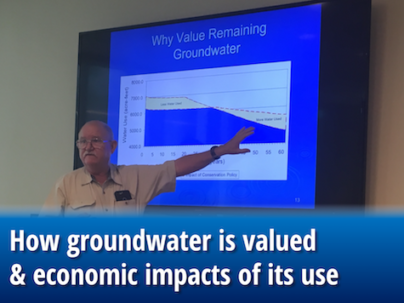How do Ogallala region producers value groundwater and groundwater conservation?
From 2016-2019, a survey of 1,126 producers was conducted across the Ogallala region by our team.
This work was led by Kansas State University sociologists Stephen Lauer and Matthew Sanderson, who gathered additional information by interviewing 41 producers in western Kansas and by performing a case study of the Wichita County Water Conservation Area (WCA), a voluntary group effort to conserve water in Kansas.
Watch: Social Aspects of Groundwater Management

1. Producers overwhelmingly support groundwater conservation.
- 92% believe that groundwater should be saved or conserved.
- 59% believe that groundwater decline is a “serious” or “very serious” problem.

“I think about water all the time…we’re all doing our part to keep our families and traditions afloat, to maintain what we have and pass it on.”
-Producer, northwest Kansas
2. Producers’ primary motivations for groundwater conservation are:
1. Securing a way of life for future generations - 84% agree; 4% disagree
2. Supporting local communities - 68% agree; 8% disagree
3. Preparing for droughts - 73% agree; 11% disagree
“I used to think that water was mine and I could do with it as I pleased. And I still think that water under my land is mine, but I also believe in a greater sense that it’s ours…and it would be extremely selfish for us to use that water up and not save it for future generations.”
-Producer, west-central Kansas
3. Aquifer depletion is seen by producers as primarily a community problem.
- A majority of producers in every state except Nebraska believe that a depleted aquifer would be a threat to their community.

“If we’re completely dry, we lose what’s the bulk of the economic driver in this community. And I think that without that we’ll slowly lose the school and the hospital because we don’t have enough to support them. And so it really becomes a slow drying up of our community.”
-Witchita Water Conservation (WCA) Team Member
4. Most producers believe they are already doing all they can to individually conserve water.
- 72% believe they already limit their groundwater use as much as possible.
- Only 7% believe they can conserve more water.
5. Producers involved in voluntary group efforts, such as Local Enhanced Management Areas (LEMAs) and Water Conservation Areas (WCAs) in Kansas, are finding additional ways to conserve.
“Since the LEMA [Local Enhanced Management Area], we’ve become better managers of water, more focused on return. We’re better off in the LEMA even with lower commodity prices because we’re managing to get a higher return.”
-Producer, northwest Kansas
“I think more water has been conserved after the LEMA talks have started than was ever conserved before. And I don’t think it has much to do with soil probes and some of this technology. I think it’s more of a state of mind. I shut my wells off when it rains and then I go back and probe and check and see. And it just seems like more people are more aware of the situation.”
-Producer, southwest Kansas
6. With support, voluntary group efforts have room to grow.
- 84% of producers are open to the possibility that voluntary group efforts can solve problems.
- 83% of producers believe that they might personally have something worthwhile to contribute.
- Only 7% of producers are currently involved in organizing group efforts.
“I want to be able to say to my kids, ‘Yep. We worked hard to save the water here so that we know we have a way of life that we can sustain for years to come.’ ”
-Witchita Water Conservation (WCA) Team Member
KEY FINDINGS
- Research, policy, and management of Ogallala groundwater can be more effective if each is able to address the role of values and attitudes.
- Voluntary group efforts are effective at conserving groundwater and merit support.


